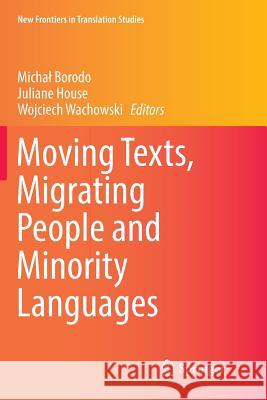Moving Texts, Migrating People and Minority Languages » książka
topmenu
Moving Texts, Migrating People and Minority Languages
ISBN-13: 9789811099694 / Angielski / Miękka / 2018 / 165 str.
Kategorie:
Kategorie BISAC:
Wydawca:
Springer
Seria wydawnicza:
Język:
Angielski
ISBN-13:
9789811099694
Rok wydania:
2018
Wydanie:
Softcover Repri
Ilość stron:
165
Waga:
0.26 kg
Wymiary:
23.39 x 15.6 x 0.97
Oprawa:
Miękka
Wolumenów:
01
Dodatkowe informacje:
Wydanie ilustrowane











